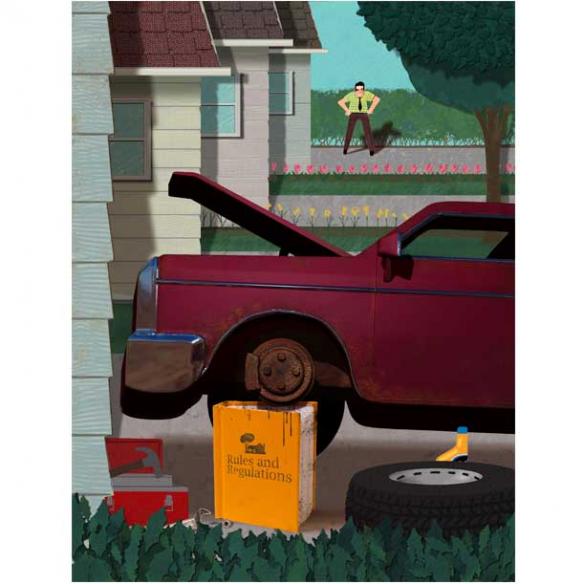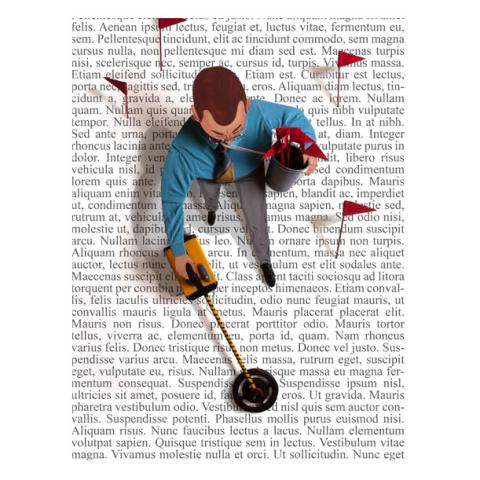A few years ago, I was dealing with the problem of writer’s block, and I was trying to stimulate a thought by looking up the definition of a word in the dictionary when I realized that the listings (if used selectively) often formed a pattern that I could use myself: a “definition” that enabled me to generate a sequence of associations and contain them in a structure that relied more on verbal synopsis than syntax. I used numbers instead of stanzas for a structure that looks like a real definition.
Sometimes a single word has several meanings, so I did not feel confined by the form. Quite the opposite: I could make “free” associations as long as I connected them. but I am not an “experimental” writer. I am more likely to observe a process or consider a problem; the more “personal,” the better.
Perhaps the most accessible poem of this kind is the following:
MARGIN
Margin (mar.gin) n-s. 1. The space on a page
beyond the main body of the text. 2. A pause
in the thought process between the seen and
the sensed. 3. The edge of vegetation that extends
from the pine barrens to the tidal flats, a wetland
the eye is hesitant to enter; its nature to remain
separate from Nature, its guiding intelligence a step
beyond the physical reality of so much salt marsh:
the sun a shadowy white against the green tussocks
of cordgrass, the flight-dragging feet of the egrets,
the sagging planks of a spindly pier; sameness
in a sinuous maze of stalks and blades; the heat
seething with insects, a glittering swarm; numberless
fiddler crabs scuttling down identical holes; dull hunks
of gurgling mollusks in the gleaming muck.; so much
seepage that a stream curves and cuts through the silt
to the sea, a glimmering expanse. 4. The broad surface
of an observed phenomenon from which an inference
is drawn: Science assumes a subject in fact and form,
but its origin remains half-hidden in the margin.
This was written a couple of years ago when I was taking a Master Naturalist course and using a field guide. Each week the class would meet with an instructor who helped us identify the plants and animals in a habitat (piedmont, sand hills, coastal plain). In this case, it was a short physical distance from the road and a short visual distance from the description on the page to the place itself - a saltwater marsh on the coast of South Carolina - but I realized that I needed to take an imaginative leap to comprehend the complexity of an ecosystem.
 Of course, a “margin” is literally “the space on a page beyond the main body of the text,” but difference between what is described (“seen”) and what is beyond words (“sensed”) is the “physical reality” of the place itself which explains “a pause in the thought process.”
Of course, a “margin” is literally “the space on a page beyond the main body of the text,” but difference between what is described (“seen”) and what is beyond words (“sensed”) is the “physical reality” of the place itself which explains “a pause in the thought process.”
Nevertheless, I began with “the edge of vegetation that extends / from the pine barrens to the tidal flats” because I wanted to deal with the way we turn whatever we see into words; especially, “if the physical reality” is comprised of “a sinuous maze of stalks and blades; the heat / seething with insects not to mention an occasional alligator or snake. No, it is easier to do what human beings usually do: discover, name, and wonder about the world at large and the origin of life.
We assume that it came from the sea, a “shimmering expanse” that serves metaphorically as the “broad surface / of an observed phenomenon from which an inference / is drawn.” But we do not know how or when it arrived on land where the “margin” is a tidal zone that teems with life as well as a margin of knowledge that remains “in fact and form” a mystery.
Even so, I began to understand the complexity and appreciate the beauty of the “margin” between the sea and the land in the process of writing “my own definition.”
Warren Slesinger graduated from the Iowa Writers Workshop with an M.F.A., in 1961 and taught English part-time while working full-time in the publishing business as an editor, marketing manager, and/or sales manager at the following university presses: Chicago, Oregon, Pennsylvania, and South Carolina.
Fellowships
He received an Ingram Merrill grant for writing (1971) and a South Carolina Poetry Fellowship (2003).
Prize
South Carolina Poetry Archives $500
Publications: Poetry and Fiction
Literary magazines
Alaska Quarterly Review, American Poetry Review, Antioch Review, Beloit Poetry Journal, Cimmaron, Comstock, ISLE, The Georgia Review, Hopkins Review, Iowa Review, Massachusetts Review, Michigan Quarterly Review, New Letters, North American Review, North Dakota Review, Northwest Review, Poetry East, Poetry Daily, Sewanee Review, South Carolina Review, Texas Review.
Book
The Evening Light (poetry) Press Ninety-Six (Furman University) 2013
Chap Books
Field with Figurations (Cummington Press, 1970)
With Some Justification (Stonewall Press, 1982)
Warren Slesinger (Puddinghouse Press, 2002)
A Word for It (Finishing Line Press, 2007)
Anthologies
Heartland II (Northern Illinois University Press, 1978)
The Anatomy of Water: American Prose Poetry (Stone Mountain, 1992)
Mercy of Tides (Salt Marsh Press, 2003)
Rough Places Plain (Salt Marsh Press, 2005)
Twenty: South Carolina Poetry Fellows (Hub City, 2005)
A Millennial Sampler of South Carolina Poets (Ninety-Six Press, 2005)
In the Yard (Old Mountain Press, 2006)
Southern Poets (Texas Tech University Press, 2007)
Readings
Picollo-Spoleto Festival in Charleston, SC and elsewhere in SC
Writers’ Colonies
The MacDowell Colony, Peterboro, NY (1966)
The Yaddo Colony, Saratoga Springs, NY (1964, 1969, 1970)
The Sitka Center for Art & Ecology, OR (2004)
The Bench Press
In 1985, I founded The Bench Press, a small press that publishes poetry, fiction and non-fiction of a regional nature. Under this imprint, I edited and published twelve books by other writers including two books that are used in creative writing courses: Spreading the Word: Editors on Poetry (2001) and The Whole Story: Editors on Fiction (1995). These are collections of essays by the editors of twenty literary magazines. Each of the editors explains the choice of a representative poem or short story and describes the editorial process of selection. At present, I teach at the University of South Carolina-Beaufort.
Illustrations by; Dave Wheeler Dave Wheeler is an illustrator living in Seattle, WA. I have freelanced for many magazines, newspapers and even a few advertising agencies. He make art out of whatever it takes (from acrylics tozbrush) to make an assignment work. One of Dave's favorite things about being an illustrator is learning about the many different topics in my assignments. It gives him new things to think about.
In addition to taking on freelance assignments, Dave is working toward developing his own independent projects including toys, original art, websites and picture books. You can see more of his work at www.davewheeler.com



